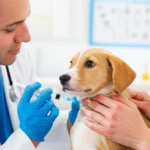Understanding Puppy Parasites: Types and Risks
Puppies are susceptible to various parasites, each posing unique health risks. Roundworms, common intestinal parasites, can cause vomiting, diarrhea, and a pot-bellied appearance. These parasites are often transmitted from mother to puppy (CDC). Hookworms, another intestinal parasite, latch onto the intestinal wall and feed on blood, leading to anemia and weakness (Companion Animal Parasite Council). External parasites like fleas cause intense itching and skin irritation and can transmit diseases. For a guide on flea prevention, see our article, How to Prevent Fleas on Dogs. Ticks, also external parasites, transmit diseases like Lyme disease, which can cause serious health problems if left untreated (CDC). Protecting your puppy from parasites is crucial for their overall health and well-being.
Protecting Your Pup: Effective Prevention Strategies
Protecting your puppy from parasites is crucial for their health and happiness. Preventative medications, available from your veterinarian, offer effective protection against heartworm, intestinal parasites, and fleas. These medications come in various forms, such as chewable tablets, topical treatments, and injections (AVMA). Regular veterinary check-ups are essential for early parasite detection and treatment (CDC). Maintaining good hygiene practices also plays a significant role in parasite prevention. Regularly cleaning your puppy’s living area, bedding, and food and water bowls can help minimize the risk of infestation (PetMD). For more in-depth information on flea prevention, check out this helpful resource: How to Prevent Fleas on Dogs.
Identifying Infestations: Common Signs and Symptoms
Parasites can cause significant discomfort and health problems for puppies. Recognizing the signs early is crucial for effective treatment. Common symptoms include persistent itching and scratching, often accompanied by visible skin irritation, redness, or hair loss (AKC). Puppies may excessively lick or chew at affected areas (VCA Animal Hospitals). Digestive issues such as vomiting, diarrhea, or changes in appetite can also indicate parasitic infections (The Spruce Pets). Additionally, changes in behavior, such as lethargy, decreased energy levels, or a dull coat, warrant attention (Purina). If you observe any of these signs, consult your veterinarian for diagnosis and treatment. For more information on dog allergies, see our article on Essential Signs of Dog Allergies to Watch For. Also, check out our guide on How to Prevent Fleas on Dogs.
Treatment Options: Eliminating Parasites Safely
Several safe and effective treatments can eliminate parasites in puppies. Fenbendazole, a common medication, disrupts the parasite’s metabolism, effectively treating roundworms, hookworms, whipworms, and some tapeworms (National Library of Medicine). Another option, Pyrantel pamoate, paralyzes certain parasites like hookworms and roundworms, allowing their expulsion from the puppy’s system (National Library of Medicine). For treating tapeworms, Praziquantel is highly effective, causing severe muscle contractions in the parasite (National Library of Medicine). A veterinarian can determine the specific parasite affecting your puppy and prescribe the most suitable medication and dosage. Regular check-ups and fecal examinations are crucial for early detection and prevention of parasite infestations. For further information on dog health and care, explore our resources on daily dog care.
Maintaining a Parasite-Free Environment: Long-Term Care
Maintaining a clean environment is crucial for preventing parasites in puppies. Regularly wash your puppy’s bedding, blankets, and toys in hot water with pet-safe detergent (ASPCA). Vacuum floors, carpets, and upholstery frequently to remove flea eggs, larvae, and other parasites (PetMD). Consider steam cleaning carpets and furniture periodically for a deeper clean. Ensure your yard is free of standing water and animal waste, which can attract parasites (CDC). Promptly dispose of any feces and maintain a clean yard to discourage infestations. For more in-depth information on preventing fleas specifically, check out this helpful resource: How to Prevent Fleas on Dogs. Regular grooming practices, including bathing and brushing, can also help control parasites (How to Groom Your Dog at Home).
Sources
- American Kennel Club – Common Puppy Parasites: How to Spot Them
- ASPCA – General Dog Care
- American Veterinary Medical Association – Parasite Control
- Centers for Disease Control and Prevention – Lyme Disease
- Centers for Disease Control and Prevention – Parasites in Pets
- Centers for Disease Control and Prevention – Preventing Infection from Pets
- Centers for Disease Control and Prevention – Roundworm
- Companion Animal Parasite Council – Hookworms
- DogsCare.life – Best Dog Care Tips: How to Care for a Dog Daily
- DogsCare.life – Essential Signs of Dog Allergies to Watch For
- DogsCare.life – How to Groom Your Dog at Home
- DogsCare.life – How to Prevent Fleas on Dogs
- National Library of Medicine – Praziquantel
- National Library of Medicine – Fenbendazole
- National Library of Medicine – Pyrantel Pamoate
- PetMD – Common Dog Parasites and How to Prevent Them
- PetMD – Intestinal Parasites in Puppies
- Purina – Symptoms of Worms in Puppies
- The Spruce Pets – Intestinal Parasites in Dogs
- VCA Animal Hospitals – Puppy Parasites and Worms


